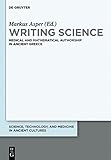Writing Science : Medical and Mathematical Authorship in Ancient Greece / ed. by Markus Asper.
Material type: TextSeries: Science, Technology, and Medicine in Ancient Cultures ; 1Publisher: Berlin ; Boston : De Gruyter, [2013]Copyright date: ©2013Description: 1 online resource (502 p.)Content type:
TextSeries: Science, Technology, and Medicine in Ancient Cultures ; 1Publisher: Berlin ; Boston : De Gruyter, [2013]Copyright date: ©2013Description: 1 online resource (502 p.)Content type: - 9783110295054
- 9783110295122
- 808.06 808.06650938
- Q124.95 .W68 2013
- Q124.95 .W68 2013eb
- online - DeGruyter
- Issued also in print.
| Item type | Current library | Call number | URL | Status | Notes | Barcode | |
|---|---|---|---|---|---|---|---|
 eBook
eBook
|
Biblioteca "Angelicum" Pont. Univ. S.Tommaso d'Aquino Nuvola online | online - DeGruyter (Browse shelf(Opens below)) | Online access | Not for loan (Accesso limitato) | Accesso per gli utenti autorizzati / Access for authorized users | (dgr)9783110295122 |
Frontmatter -- Preface -- Contents -- Introduction -- A. Comparisons -- The Name and Nature of Science: Authorship in Social and Evolutionary Context -- Ancient Writings, Modern Conceptions of Authorship. Reflections on Some Historical Processes That Shaped the Oldest Extant Mathematical Sources from Ancient China -- Scholarship and Competitiveness: Pliny the Elder’s Attitude towards His Predecessors in the Naturalis Historia -- B. Greek Medical Writing -- Writing the Animal: Aristotle, Pliny the Elder, Galen -- Galen and the Scientific Treatise: a Case Study of Mixtures -- Galen on Poetic Testimony -- The Violent Scholiast: Power Issues in Ancient Commentaries -- C. Greek Mathematical Writing -- Authorial Presence in the Ancient Exact Sciences -- Accounts, Numeracy and Democracy in Classical Athens -- Diagrammatic Reasoning: the Foundations of Mechanics -- Three Introductions to Celestial Science in the First Century BC -- D. Science Writing as/and Literature -- On the Variety of ‘Genres’ of Greek Mathematical Writing: Thinking about Mathematical Texts and Modes of Mathematical Discourse -- Sing, Muse, of the Hypotenuse: Influences of Poetry and Rhetoric on the Formation of Greek Mathematics -- Making up Progress – in Ancient Greek Science Writing -- In Strange Lands: Disembodied Authority and the Role of the Physician in the Hippocratic Corpus and Beyond -- Notes on Contributors -- General Index -- Index Locorum
restricted access online access with authorization star
http://purl.org/coar/access_right/c_16ec
Scientific and technological texts have not played a significant role in modern literary criticism. This applies to Classics, too, despite the fact that a large part of the field’s extant texts deal with questions of medicine, mathematics, and natural philosophy. Focusing mostly on medical and mathematical texts, this collection aims at approaching ancient Greek science and its texts from the cross-disciplinary perspective of authorship. Among the questions addressed are: What is a scientific author? In what respect does scientific writing differ from ‘literary’ writing? How does the author present himself as an authoritative figure through his text? What strategies of trust do these authors employ? These and related questions cannot be discussed within the typical boundaries of modern academic disciplines, thus most of the sixteen authors, many of them leading experts in the fields of ancient science, bring a comparative perspective to their subjects. As a result, the collection not only offers a new approach to this vast area of ancient literature, thus effectively discovering new possibilities for literary criticism, it also reflects on our current forms of scientific and scholarly written communication.
Issued also in print.
Mode of access: Internet via World Wide Web.
In English.
Description based on online resource; title from PDF title page (publisher's Web site, viewed 28. Feb 2023)


